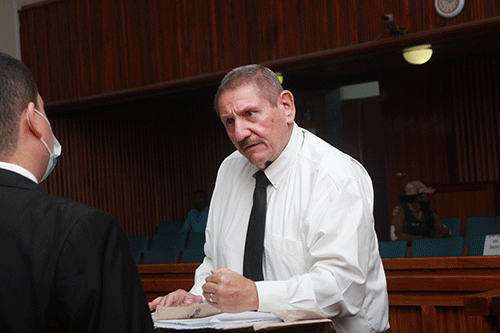Windhoek High Court Judge Christi Liebenberg yesterday admitted a confession by double murder accused Ernst Lichtenstrasser made to several police officers after a prolonged trial within a trial.
Lichtenstrasser made a U-turn after the confession and claimed that he was so fatigued after a nearly three-week hunger strike that he did not know what he was doing or saying when he made the admissions. He further said that he was clearly not in his sound and sober mind when he recorded the confession.
Judge Liebenberg, however, found that he was not influenced by any external factors when he made the confession and that he was well aware of what he was doing.
“The accused was cognisant of what he was doing and of his right to legal representation and he voluntarily decided to waive these rights,” the judge stated. Furthermore, the judge said, the accused was familiar with his rights and had the opportunity to invoke these rights, but he implicitly waived the rights available to him by choice.
Legal Aid lawyer Albert Titus, on behalf of Lichtenstrasser, objected to evidence led by deputy prosecutor general Antonia Verhoef on admissions made by his client during an interview on 15 May 2019 in Walvis Bay.
During that interview, Lichtenstrasser allegedly admitted that he was the shooter in the murders of two senior executives of the NIMT institute in Arandis.
Inspector Reinhardt Maletzky testified that Lichtenstrasser told him during an interview at the Arandis police station in April 2019 that he was happy that Eckhardt Mueller who was the executive director at the time and his deputy Heinz Heimo Hellwig were gunned down at the entrance of the Arandis NIMT offices at the Erongo mining town on 15 April 2019.
“I was the shooter,” Lichtenstrasser told him shortly before he said that he wants to tell them the truth, but will withhold the truth until he consults his lawyer, Maletzky testified at the time.
Maletzky further said that in a subsequent interview when they confirmed the cartridges found at Lichtenstrasser’s residence and a farm where had done some practice shooting and those found at the murder scene were fired from the same firearm, Lichtenstrasser offered to confess and they then recorded the confession
on a cell phone belonging to another officer.
Titus also objected to the confession, saying it was not done procedurally. The judge, however, ruled that it was done in accordance with procedures and there was nothing untoward about it. With regards to Lichtenstrasser’s claim that he repeatedly requested for a lawyer to be present during the interview, the judge found that the accused waived his rights to remain silent and legal representation when he opted to give a statement, regarded as a confession.
With regards to the contention by Lichtenstrasser that he was not in his sound and sober mind when the confession was recorded, the judge found that when considering the totality of evidence relevant to the question of his state of mind when making the confession, he is unable to conclude that the accused was not in sound and sober mind and dismissed the possibility.
Lichtenstrasser pleaded not guilty to two counts of murder, two counts of possessing a firearm without a licence, and further charges of possessing ammunition without a licence, defeating or obstructing the course of justice, theft and the unauthorised supply of a firearm and ammunition at the start of his trial. He did not provide a plea explanation and Titus confirmed the pleas and told the court his client will make use of his constitutionally guaranteed right to remain silent and put the onus on the State to prove each and every allegation against him. The matter continues today when the confession is to be read into the record and Lichtenstrasser remains in custody.
-rrouth@nepc.com.na



